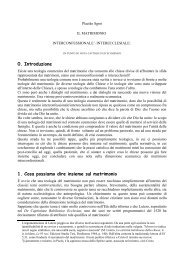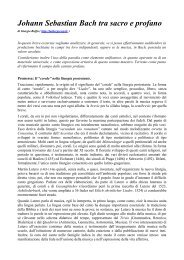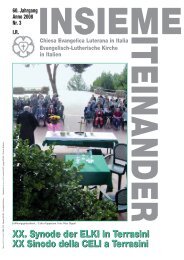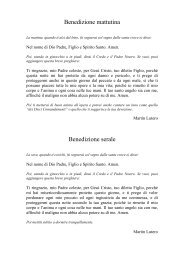Il dialogo ecumenico e interreligioso: quale futuro? - Nemesistemi
Il dialogo ecumenico e interreligioso: quale futuro? - Nemesistemi
Il dialogo ecumenico e interreligioso: quale futuro? - Nemesistemi
You also want an ePaper? Increase the reach of your titles
YUMPU automatically turns print PDFs into web optimized ePapers that Google loves.
che le Chiese si inserivano nell unico movimento <strong>ecumenico</strong>. Vale questo ulteriormente per il<br />
<strong>dialogo</strong> <strong>ecumenico</strong> e le sue scommesse? La conversione dialogale del cammino <strong>ecumenico</strong> non è<br />
più considerata problema individuale, ma problema ecclesiale di fondo, di rapporto con le Chiesa<br />
stesse e Cristo. <strong>Il</strong> movimento <strong>ecumenico</strong> afferma che sono «le Chiese» ad essere soggetti del<br />
<strong>dialogo</strong> 1 . Esse sono soggetto nella misura in cui il <strong>dialogo</strong> istaura un loro rapporto di trasparenza<br />
con Cristo nello Spirito. <strong>Il</strong> <strong>dialogo</strong> «penetra» le Chiese trasversalmente. Esso porta le Chiese al dilà<br />
di se stesse nel loro rapporto con Cristo rivelando vie ulteriori del cammino e nuovi traguardi. <strong>Il</strong><br />
<strong>dialogo</strong> ha più a che vedere con il mistero della Chiesa che con le strutture assestate delle Chiese,<br />
che si trovano prese in un vortice che gli supera al dilà di ciò che potrebbero essere tentate di<br />
interpretare come centralità gerarchica e vertice ecclesiale ultimo. <strong>Il</strong> <strong>dialogo</strong>-metodo-di-conversione<br />
viene prospettato ai suoi vari livelli di attuazione storica: conversione a Cristo nella dinamica<br />
ecumenica e conversione a Dio nel <strong>dialogo</strong> <strong>interreligioso</strong> (con riferimento prioritario ai fratelli<br />
ebrei) 2 . Nel <strong>dialogo</strong>, la conversione stessa è nelle mani di Dio, al di là della testimonianza che si<br />
dà della propria adesione di fede (sia in senso cristiano, sia nell intento delle religioni dell umanità<br />
dalla strettoia ecclesiologica del ritorno in senso cristiano alla conversione-dal-paganesimo in<br />
senso <strong>interreligioso</strong>) 3 .<br />
NON C È DIALOGO SENZA DIVERSITÀ: DAL MISTERO DIVERSO DI DIO ALLA<br />
NOSTRA DIVERSITÀ<br />
<strong>Il</strong> <strong>dialogo</strong> implica la valorizzazione della diversità 4 , esso è anche l unico modo di gestire la<br />
pluralità 5 . Uno dei problemi più delicati è il confronto paradossale tra due priorità del movimento<br />
<strong>ecumenico</strong>: indigenizzazione e unibilità 6 , da contestualizzare poi nella inevitabile interdipendenza<br />
di convivenza odierna 7 . "Siccome una certa diversità di usi e costumi... non si oppone<br />
minimamente all'unità della Chiesa, anzi ne accresce il decoro e non poco contribuisce al<br />
compimento della sua missione... La osservanza di questo tradizionale criterio... appartiene a quelle<br />
cose assolutamente richieste come previa condizione al ristabilimento dell'unità... Ciò che è stato<br />
detto circa la legittima diversità, piace dichiararlo anche della diversa enunziazione delle dottrine<br />
teologiche." 8 . La legittima diversità è condizione per poter vivere la piena comunione, essa sorge<br />
mais il doit avoir lieu entre Rome et le Christ, entre Canterbury et le Christ, entre Moscou et le Christ. Peut-être le vivrons-nous encore à la fin de ce<br />
siècle. <strong>Il</strong> y a des signes qui vont en ce sens, telle la préparation d'un concile panorthodoxe de l'Orient. Je puis très bien m'imaginer que Jérusalem soit<br />
le lieu d'un tel événement, la ville du premier concile des apôtres, la ville où se trouve le berceau de l'Eglise, la ville où la première eucharistie fut<br />
célébrée et où les apôtres, avec Marie, la mère de Jésus, ont reçu l'Esprit Saint. L'écrivain T. S. Elliot a dit un jour: «Au bout de toutes nos<br />
découvertes, nous aurons à nous retrouver à notre point de départ». Bien sûr, c'est un rêve, mais rêver est important. Je me rappelle les paroles d'une<br />
chanson brésilienne: «Quand un homme rêve seul, ce n'est qu'un rêve, mais lorsque plusieurs font le même rêve, c'est le début d'une nouvelle<br />
réalité»».<br />
1<br />
JOINT WORKING GROUP OF THE ROMAN CATHOLIC CHURCH AND THE WORLD COUNCIL OF CHURCHES, On the ecumenical<br />
Dialogue, in «The ecumenical Review», 1964 nº 4, p. 471: «The subject of the dialogue is always, to a certain extent, the Churches; for even an<br />
individual Christian who speak for himself a whose thought has been does so as moulded by his own Church, which remains in some measure present<br />
in him. Furthermore, at the outset the ecumenical dialogue is not so much a dialogue between the confessions as a dialogue within the confessions.<br />
Whatever the results, they must be shared with the whole Church. Those participating in the dialogue are not merely the voices of the Church; they<br />
are also speaking to the Church».<br />
2<br />
J. Dupuis, Dialogue interreligieux, in AA. VV., Dictionnaire de théologie fondamentale, Paris 1994, p. 263.<br />
3<br />
WORLD COUNCIL OF CHURCHES, TCDC, in «Bulletin of the Secretariate for non Christians», 1977 n° 36, p. 128: «e) Dialogue is a way of<br />
living with others. We were reminded of specific situations in which individuals of different faiths live in the same family. Here the relationship<br />
cannot be defined purely in terms of proclamation. Dialogue in this instance consists not only of entering with them into deeper relationships in life<br />
situations, but sometimes in raising our partners in intercession to God. Such living in itself constitutes our witness. Some among us felt that such<br />
wimess must lead us further to verbalize our faith and invite our partner to enter our community. There may be occasions in which each of the<br />
partners in dialogue may feel urged openly to invite the other to participate in his or her faith, be it Christian, Buddhist or Hindu. But the response to<br />
the witness is something that has be the initiative of the partner in dialogue. Some among us felt that conversion, when it takes place, is primarily to<br />
God and to a new relationship of love with the other and does not always imply the joining of any of the historical denominational churches as they<br />
now exist».<br />
4<br />
SECRÉTARIAT POUR L'UNITÉ DES CHRÉTIENS, Dialogue, in Information service , 1970 n 2, p. 8 n 5.<br />
5<br />
K. Lehmann, Du dialogue comme forme de la communication et de l approche de la vérité dans l Eglise d aujourd hui, in Documents épiscopats ,<br />
1995 n 7, p. 5.<br />
6<br />
FAITH AND ORDER, Paper n 73, Geneva (ciclost.), februari 1973, p. 32.<br />
7<br />
WORLD COUNCIL OF CHURCHES, Breaking Barriers (The Official Report of the Fifth Assembly of the World Council of Churches), Nairobi<br />
1975, S. II, London 1975, p. 6.<br />
8<br />
CONCILIO ECUMENICO VATICANO II, Decreto "Unitatis redintegratio", Città del Vaticano 1965, n 16-17.<br />
48







